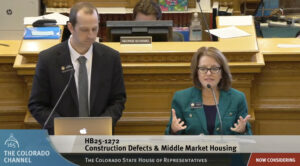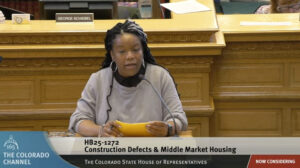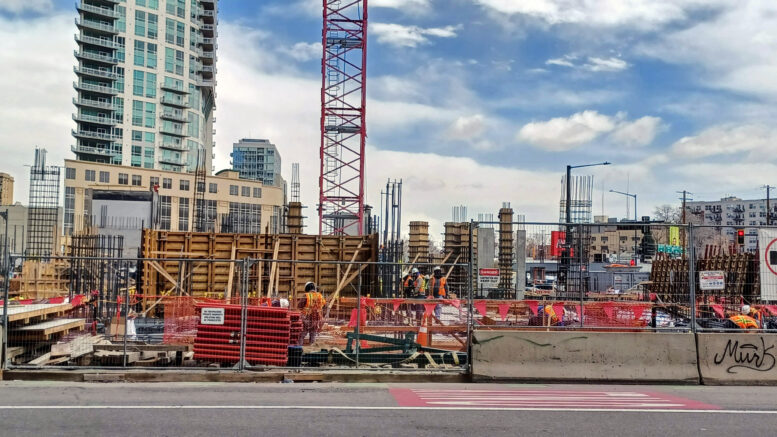After the addition of eight amendments meant to salve critics, sponsors of a construction-defects reform bill watched it pass the House Monday by a 59-5 margin that was jaw-dropping less than one year after an ideologically similar measure died in committee.
The question that backers of the latest effort may have to answer now is not whether they can build consensus around the reform but whether House Bill 1272 actually will restart the dormant condominium-building sector as it promises.
This new effort from Democratic Reps. Shannon Bird of Westminster and Andy Boesenecker of Fort Collins seeks to accomplish that long-stated and repeatedly failed goal by changing tort law to make it easier to fix condo defects and harder to sue over them. Past efforts, like a 2017 law that backers mistakenly thought would boost development of affordable multifamily owner-occupied housing, concentrated more on keeping owner-builder fights out of the courtroom than on ensuring repairs could happen while doing so.
How the new construction-defects bill is different
HB 1272, which also has the backing of Democratic Gov. Jared Polis, puts emphasis on repairs by creating a voluntary program into which builders could enter if pay for third-party inspections during construction and offer warranties covering one to six years of repairs. In exchange, those builders would face a shortened time for homeowners to bring lawsuits and a narrower set of conditions under which they could do so, including a provision that alleged damages must affect the functionality of a system or have caused harm.

Colorado state Rep. Shannon Bird explains House Bill 1272 Friday while standing beside cosponsoring Rep. Andy Boesenecker.
To restart condominium construction that now accounts for about 3% of new supply — down from about 20% in 2005 — the bill must reduce risk of lawsuits enough that it lowers insurance premiums, which account for five times the percentage of construction costs in condos as they do in apartments. After builders said during a committee hearing last month that requirements to repair alleged defects in a two-month timespan could void their insurance policies, Bird added an amendment making it illegal to cancel policies because repairs are offered.
Her host of amendments Friday largely went toward opponents’ criticisms, as she changed the bill to require inspectors to be independent from the builder, to ensure warranties cover repairs at no cost to owners and to impose consistent standards for fixing problems. But she also aided builders and condo owners by requiring that any legal settlement must pay for repairs before it goes to attorneys and by clarifying that plaintiffs can only seek documents that are in builders’ possession.
Continued worries from lawyers, homeowners
“For the past two decades, the cost to own a home has only continued to climb, and it’s become out of reach for too many of our neighbors and our constituents,” Bird said, noting condos are meant to offer lower-priced entry to home ownership for young professionals. “It’s a problem that I believe we have a moral obligation to fix. When you have the financial security of owning your own home, you are no longer at the whim of changing rental rates or lease terms.”
Skeptics of the bill generally applauded the changes but said there remains more that is needed to ensure that Coloradans making the largest purchase of their lives have the legal ability to get defects fixed when roofs leak or walls cave. Among the conditions that the Build Our Homes Right coalition of attorneys and homeowners want to see are extended time limits on warranties, mandatory disclosure of insurance coverage by subcontractors and the ability to bring fraud and breach-of-contract claims even if damage and harm have not yet been caused.

Colorado state Rep. Jennifer Bacon outlines her concerns about House Bill 1272 on Friday.
“The questions that we have entered the conversation with are: How do we get to a place where we can build the inventory but also a homeowner can easily understand how to get their problems fixed and also can do that affordably?” said Rep. Jennifer Bacon, a Denver Democrat who killed her competing bill to expand homeowners’ rights in order to negotiate changes into HB 1272. “So, the purpose of this bill on one hand is to talk to the market about what they need to build. But it cannot be at the expense of the homeowner.”
Worries too from construction leaders
But for all the legislative support Bird is attracting, its supporter from the homebuilding community remains lukewarm. Rep. Dan Woog, R-Erie, noted that most construction groups remain in positions where they are monitoring the bill or seeking amendments, and he laid out laid out before final House approval on Monday the changes that they need.
The third-party inspection process is overprescribed and tends to put too much liability on these privately employed inspectors while removing liability from municipal and county inspectors who must issue certificates of habitability, Woog said. And the reliance on private inspectors could leave a shortage of them in more rural areas, which could in turn cause delays in construction.
Also, the bill, rather than making the claims process easier to navigate for both builders and homeowners, makes it more complicated in places, which could lead to hesitancy to jump back into the condo market, Woog said. And even as it seeks to bar lawsuits over what might be considered minor defects, the definitions on what can and can’t be raised in a legal action remain too vague, he said.
Senate president takes lead going forward
“I want to support a fix that will achieve the stated goals of the sponsors,” said Woog, who is one of the original 20 cosponsors of HB 1272. “But we honestly can’t say that yet.”
Just five Democrats voted against the bill: Reps. Lorena Garcia of Adams County, Javier Mabrey of Denver, Brianna Titone of Arvada, Steven Woodrow of Denver and Yara Zokaie of Fort Collins.
Bird committed to continuing to work on changes as the bill heads now to the Senate, where President James Coleman, D-Denver, is one of its primary sponsors. Those include the request to ensure homeowners can bring claims against contract breaches that don’t involve defects and ensuring that builders can’t run the clocks out on warranties after being asked for repairs.
Coleman has yet to introduce the bill in the Senate or indicate its committee assignment.
